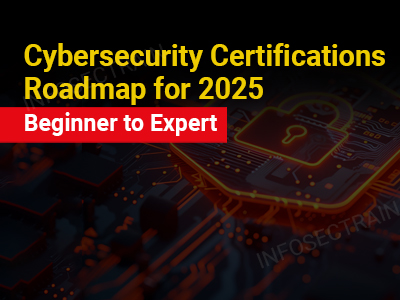This blog outlines the Cybersecurity Certifications Roadmap for 2025, helping you explore the journey from beginner to expert. Whether you're new to the field or a seasoned professional, this guide will show you the certifications that matter most in shaping a successful career.
Step 1: Laying the Foundation (Beginner Level)
If you’re starting in cybersecurity, foundational certifications are critical. They introduce you to core concepts like threat management, risk assessment, and basic security protocols.
- CompTIA Security+ Certification Often considered the entry point into cybersecurity, this globally recognized certification equips you with a strong understanding of network security, cryptography, and incident response. It’s ideal for newcomers looking to establish a foothold in the field.
- CEH v13 AI Certification As cyberattacks become more complex, ethical hacking has emerged as a key skill for cybersecurity professionals. The CEH v13 AI certification goes a step further by incorporating artificial intelligence into its curriculum, making it one of the most innovative certifications in 2025. It provides hands-on experience in penetration testing, vulnerability identification, and defensive strategies.
Step 2: Building Expertise (Intermediate Level)
Once you’ve mastered the basics, it’s time to advance to certifications that validate your ability to manage cybersecurity challenges at an organizational level.
- CISM Certification (Certified Information Security Manager) The CISM certification bridges the gap between technical knowledge and managerial responsibilities. It focuses on governance, risk management, and incident response, perfect for professionals aiming to transition into leadership roles or oversee enterprise security strategies.
- CISA Certification (Certified Information Systems Auditor) For those interested in auditing, assessing, and controlling information systems, the CISA certification is a game-changer. It emphasizes regulatory compliance, risk assessment, and IT governance, making it a top choice for professionals in audit and assurance roles.
Step 3: Specializing and Leading (Advanced Level)
At this stage, certifications should reflect mastery in specialized areas like cloud security or enterprise-wide risk management.
- CCSP Certification (Certified Cloud Security Professional) With the rapid adoption of cloud technologies, securing cloud infrastructures has become a critical need. The CCSP certification ensures you’re equipped to address challenges in cloud architecture, data protection, and compliance. This credential is a must-have for professionals working in or transitioning to cloud security roles.
- CISSP Certification (Certified Information Systems Security Professional) Often regarded as the pinnacle of cybersecurity certifications, CISSP validates your expertise across eight domains, including software development security, risk management, and asset security. It’s ideal for senior professionals eyeing executive roles such as Chief Information Security Officer (CISO).
Why Follow a Certification Roadmap?
The cybersecurity landscape is continuously evolving, and professionals need to stay ahead of emerging threats and technologies. A structured roadmap not only helps you acquire relevant skills at each stage of your career but also enhances your employability and earning potential.
According to recent studies, certified professionals earn significantly higher salaries and are preferred by employers for critical roles. Moreover, certifications like CEH v13 AI and CCSP keep you updated on cutting-edge trends like artificial intelligence and cloud security.
How to Plan Your Certification Journey for 2025
- Beginner: Start with CompTIA Security+ for foundational knowledge and follow it up with CEH v13 AI Certification to build practical skills in ethical hacking.
- Intermediate: Progress to managerial and audit-focused certifications like CISM and CISA to broaden your expertise and qualify for leadership roles.
- Advanced: Specialize with CCSP for cloud security and crown your journey with CISSP to achieve mastery and secure senior-level positions.
Final Thoughts
The journey from a cybersecurity beginner to an expert is not just about acquiring certifications but about evolving as a professional. Each certification you pursue equips you with new skills and knowledge, enabling you to address real-world challenges confidently.
As we approach 2025, the demand for certified cybersecurity professionals continues to rise, driven by a global shortage of skilled talent. By following this roadmap, you can position yourself as an in-demand expert ready to tackle the challenges of tomorrow.
Media Contact
Company Name: InfosecTrain (An Intiative by Azpirantz Technologies LLP)
Contact Person: Vikas Agrawal
Email: Send Email
Phone: 18008437890
Address:B-7 (1st floor), Sector 1
City: Noida
State: Uttar Pradesh 201301
Country: India
Website: www.infosectrain.com















